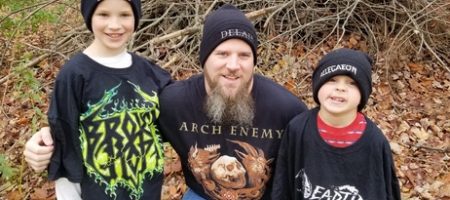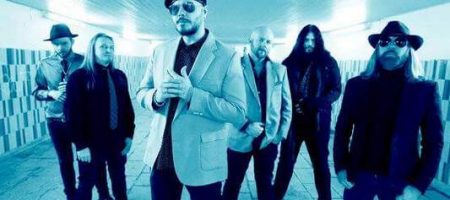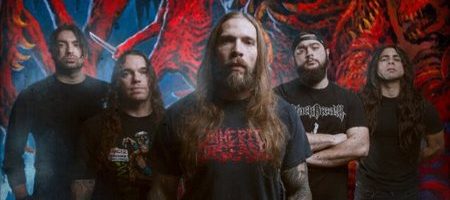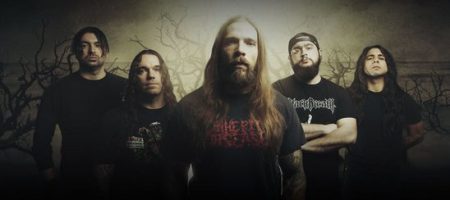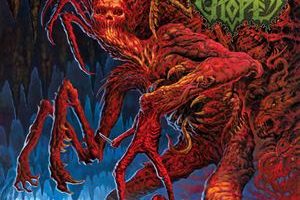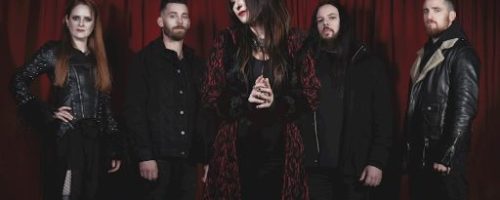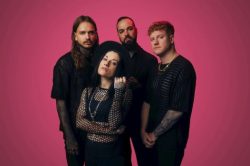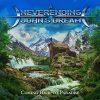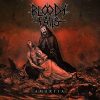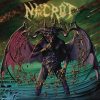Jeremy Wagner – Crafting a Rabid Heart
Thursday, 11th October 2018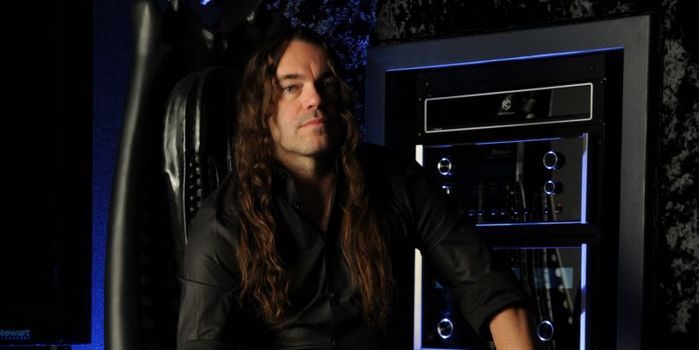
Living and breathing in two worlds has been par for the course for Jeremy Wagner for many years. His band, Broken Hope, has been a staple of the death metal genre for 30 years and are a celebrated act for both veterans and newcomers due to recent outings with Mutilated and Assimilated and Omen of Disease. But Wagner has also had his hands busy with writing horror and dark fiction. As the writer of Broken Hope’s lyrical content, it seemed a natural starting point that he then propelled into short stories and full novels.
Wagner’s first novel, The Armageddon Chord, was published in 2011, and now Rabid Heart (available for purchase HERE) has been released as his second. Where The Armageddon Chord merged quite a bit of music and mystery together, Rabid Heart leans further into the horror genre, but with some fresh and exciting twists. A story with both gore and a surprising amount of heart, it didn’t take much to rip through the novel initially in the better part of an afternoon due to its brisk pacing and overall excitement. So when given the chance to chat with Wagner about the book, many of those topics came up, as well as how he balances writing and music, what’s up with Broken Hope, and perhaps most tantalizing, a glimpse into what stories he is currently working on.
Dead Rhetoric: With zombies being a big piece of the horror market, how did you give Rabid Heart a different twist on the apocalypse formula? I saw that you started the book at one point, and came back to it much later.
Jeremy Wagner: The seed was planted, as you mentioned, I had started to write Rabid Heart as a short story for an anthology of zombie tales that St. Martin’s Press was putting out. That collection was called Hungry for Your Love. So I started Rabid Heart and it was going beyond the maximum word count, which I think was like 5,000. I just kept going and going. I got to about 30,000 words and stopped. I knew it was way too long and it wasn’t going to make it into that book. The story had taken on a life of its own. So I went back and wrote a totally different zombie story, which was more voodoo-zombie related. Right around that time, when the short story collection came out, I had another book that I had been polishing, which was The Armageddon Chord.
So the short story collection came out through St. Martin’s Press, which put my name out on the map in a way. The collection sold well and had good distribution. Next thing I knew, I had a book deal for The Armageddon Chord, and so I threw myself into that. So that came out, and I was busy promoting that and doing some other writing. I had this beginning of Rabid Heart just sitting there. After The Armageddon Chord cycle was done, I came back to Rabid Heart and finished the first draft. Typically what I do when I write the first draft is to let it sit and cool down, while I work on something else. So I wrote a new novel, and came back to it. When I re-read that first draft of Rabid Heart, I thought I had something cool there.
To your question, what I wanted to do with the zombie culture, whether its movies, shows like The Walking Dead, comic books, and everything else – it can be oversaturated. It can be hard to do something original. I grew up as a zombie-loving fan as a kid, with movies like George Romero’s Dawn of the Dead and Day of the Dead. I also liked apocalyptic movies – I was a huge fan of The Road Warrior, with Mel Gibson, and other apocalyptic tales like Stephen King’s The Stand and Cormac McCarthy’s The Road.
In my mind’s eye, I had this idea of telling an apocalyptic tale with zombies in it. I didn’t want The Walking Dead type of zombies in it either. Zombies that really freaked me out in recent years – 28 Days Later had such violent and “fast” zombies and it freaked me out and sparked something within me too. So I wanted to tell a story that had a strong female lead character, as that was another idea I had wanted to explore. The ideas sort of came to me. I’m not forcing ideas, like I want to write a zombie novel for the sake of it. The spark grew from wanting to write the short story and this idea blossomed into something that just kept going and going.
Another thing I wanted to center on was a different kind of story. I really tried to center on the main character, Rhonda Driscoll – what if everyone you know were all gone tomorrow because of some pandemic like this. You survived, and 6 months after that the world is changed and is pure chaos. It is a bit like going to war. This character has like, PTSD to a certain extent. On top of it, you find your better half, who is now zombified/Cujo-fied and could you put that loved one out of their misery? It probably wouldn’t be.
One thing I’ve mentioned recently, is that it’s hard for me to put down a beloved pet who is old and losing their faculties. Some people are able to do that with a pet easier than me, but I have trouble with it. I just couldn’t imagine putting a bullet in like, my wife’s head if she came back from the dead. These are the thoughts of my imagination, and the things I question as I am viewing the world through my character’s eyes. So I took those things into consideration and tried to make a more original take on an apocalyptic tale.
Dead Rhetoric: There’s some clear references to Stephen King in the book, and some influence from Cormac McCarthy. Do you see those points as a bit of an homage? You have a good view on how these stories set up, and that’s where it seems that you can skew away from the norm.
Wagner: When it comes to Stephen King, just as a huge source of inspiration in my formative years as a young writer – there’s definitely some nods to him, especially in the beginning of the book. It talks about the necro-virus turning people into what they nickname “Cujos.” Anybody who is familiar with the Stephen King universe knows that Cujo was a story about a rabid dog that terrorizes a town in Maine. So there’s that total salute to Stephen King there. With Cormac McCarthy’s The Road, and his entire bibliography – it’s totally worshipped and embraced by me. I love everything that guy has ever written. Even to the point where I have academic books that I have bought, with these intellectuals that dissect his writing. So I’m really crazy about him. The thing about McCarthy is that he has such a bleak and sobering take on things when I writes a book. That’s something I really connect with because I’m really into dark fiction and stories that don’t have happy endings. It’s more realistic.
The Road paints a really bleak picture – the novel and the movie. When I took all that in, which I’ve done both multiple times, it really hits home with me. This is probably what you would deal with, and what the world would be like. How people would revert into monsters, they aren’t even zombies but real people. I latched onto that. That kind of vibe is what I wove into Rabid Heart as well. As Rhonda Driscoll goes on this road trip thinking she is going to get to some happily ever paradise with her fiancé, and it couldn’t be further from the truth. There’s one part PTSD that makes her do some really dumb decisions, and the other part is just the naivety that she thinks things are going to be hunky-dory and they are not. So that Cormac McCarthy type of vibe definitely played a major role in influencing this type of story with me.
The other thing I’d like to point out that I think played a role with how I portrayed other characters, such as the bad guys – not only did Cormac McCarthy do a good job with that in The Road, but Stephen King did it with The Stand. Regular people turned into monsters. That’s a part of human history. I’m a huge WWII buff and I’m fascinated with Nazi Germany and the Third Reich and how all these evil people were able to not just power, but the simple fact that people survived the Holocaust would say, “You’d see these men outside of their uniform [Nazi soldiers], and soon as they looked like regular people. But they would put on these uniforms and they would look more powerful and they certainly act and wield more evil power over human beings all because of that uniform or opportunity of power. It opens up a floodgate.”
I kind of took that idea of human nature, given the opportunity, what people would do atrocities and what people wouldn’t, and portrayed the bad guys in the book that way. The world is up for grabs, how far will people go to survive or just embrace their inner evil? That’s a part of it too. Then you have this young gal who was happy doing hair in her hometown, and now everything is upside down and this is the world she lives in. It’s a scary place.
Dead Rhetoric: There’s a lot of heart within the story as well. What do you see the role of gore, with a story like this? Obviously there’s plenty, but it’s never to the point where it becomes the main focus.
Wagner: Thanks for saying that, because with Broken Hope, God knows there’s enough gore in those lyrics…to the max [laughs]! When I write novels, they aren’t like Broken Hope lyrics, and with a story like this, I don’t go for the throat with trying to portray gore or anything over the top to grab the reader’s attention. First and foremost, the story has to flow. It tells itself. I don’t have any premediated things in mind. I have some specific ideas where I want the story to go in the beginning, and I definitely write horror and dark fiction, and bad stuff happens.
When it comes to gore and horror scenes, when I write them, it might sound funny but I’m definitely into the scene. The hair stands up on my arms and I’m like, “This is going someplace horrible and it could be bloody and messy.” But at the same time, I want to bring that detail but I also want to tell the story through the character’s eyes that it is happening with. Again, I don’t intentionally go for the throat. If something happens that is going to make the reader wince, like Stephen King would say, “I told the truth.” It just happened that way.
Gore is an important tool, if you will, when writing. I keep mentioning Stephen King, but he has created so many great tools for horror writers to reference. The guy is really great at encouraging writers. In his book, A Memoir of the Craft, he gets into using the write tools when you write. That’s something I learned at a young age, being an avid Stephen King reader and a reader of other horror authors. But Stephen King will tell you, and to his point, I can semi-quote this from the top of my head: there’s three types of terror. You have the gross-outs, which is one type. Imagine you are reading a story and someone is on the farm and someone gets caught in the wheels of a combine and is disemboweled and there are internal organs flying over the farm equipment [laughs]. That’s the gross-out. The splatter, the goop, and the blood raining down.
Then there’s the horror. You have the unnatural things. In the case of Rabid Heart, you have basically the walking dead. A necrotic virus that has killed human beings, but keeps them in motion due to this rabies-type deal that was developed by the government. You have to love the old throwback that ‘it’s the government’s fault’ [laughs]! That’s the horror part. The thing that reaches out and grabs you from under the bed. You don’t know it’s origin. The third type of terror is terror itself, which is different from horror. Terror is if you have Dead Rhetoric office, and you go there one day and the whole place is gone or changed. People that you expect to be there are gone, and then the lights go out and you feel breath on the back of your neck. That’s terror.
To my point of telling this, the three types of terror are what I subconsciously use. ‘Uncle Stephen King’ – gross-out, horror, and terror are tools that I use subconsciously when telling a story. So I try not to go too far with the gross-out. I really like to latch more onto the horror and terror because I think they are more effective. It creeps people out more, and scares a bit more. I don’t push it, but that’s where my head is at.
Dead Rhetoric: Both novels have also had some great pacing. As I was saying, I basically read the entire book yesterday. How do you zone in on what’s important in terms of storytelling and where you can trim parts down?
Wagner: That’s a really great question – it happens after doing numerous revisions. When I did the first draft of Rabid Heart, I might have had 120,000 words. Then I re-read it, and when I do that I start revising and cutting stuff down and making sure things are accurate. You’d be amazed how you can forget stuff as a writer when you start a novel and make it to the end. Say Rhonda Driscoll was a brunette, but I may have started the book with her as a blonde [laughs]. So how did her hair change color? This shit is wrong.
So just getting facts straight and cutting the fat…in recent interviews I’ve been doing, I’ve been mentioning the great Elmore Leonard, who is another favorite author of mine. He has a great quote when he was asked how he could write such page-turning books and he said, “I cut out the boring parts!” I always love that quote because it’s true. Between my own revisions, and working with great editors.
I had a great editor this time named Juliet Ulman. She is an award-winning editor and she’s worked with a lot of sci-fi/horror writers and publishers. She’s a really fantastic editor. She was the best. She would cross out whole pages and say, “This is an info-dump. You are not Tom Clancy. Why are you trying to educate the reader?” I had one chapter with six pages about rabies and its origin, and how the government used rabies to try to make super-soldiers and things like that. I was trying too hard as a writer to look like I’m really smart like Michael Crichton, and I was boring the reader with too much technical info. She was right too! It was a total info-dump and I was guilty of it. It did not help the story.
Removing sections like that, and really whittling it down so that the pace is flowing. Even simple stuff, like questioning what the character would or wouldn’t do – and removing things they wouldn’t do. I got rid of sections and other characters that didn’t work that aren’t even in the book. I sound like a broken record citing [Stephen] King, but I think he or some other famous author said, ‘You have to kill your darlings.’ There’s things and characters that you feel are important and you love, but they had to go because it didn’t’ help the story and it didn’t help the pace. But you know what, the story didn’t need that stuff.
It’s just a lot of hard work. Which I really love by the way. I really love editing and the craft of writing. I love the whole process. When you do numerous revisions, it’s fun to do for me, and I know that I’m getting to a better story at the end. The analogy I use that that you are building a statue with a piece of marble. You are chipping away until one day it’s polished and a beautiful sculpture. Writing a book is like that.
Dead Rhetoric: You mention that you love the craft of writing and the editing process. Would you be willing to do some sort of horror writing workshop or something like that?
Wagner: I’ve thought about that, because I always like to share knowledge and encourage young people, or even older people who want to get into writing fiction, and music too. I’ve always encouraged younger bands. My stepson is in a grindcore band, and I always give them advice. Like, “When I was your age, our first album came out or second album came out. The music business has changed, but this is what I’d do, or try to do this.” But just to encourage and share that wisdom, and it’s the same with writing. I love to encourage writers of any age – there’s things I’ve learned along the way to make me a better writer.
I never forget where I come from. I’ve been fortunate to have people who were already published authors or established editors that took me under their wing and gave me the equivalent of a college education on writing fiction and being a novelist. There are many people who are quick to dismiss young writers. It’s the same with musicians. Growing up, there’s always naysayers – people who are in established bands or in the business that look down on you like, “Kid, you won’t ever make it” and won’t give you the time of day. Then there’s the good people who are in big bands, who give you the opportunity to open for them, give you advice, or pass your demo tape onto someone. Same with writers and editors who take a serious look at your writing, critique it, and tell you what to do better. They refer you to other people along the way. I’ve had a lot of good people. I don’t even pay attention to the bad people. I take that and never forget those who took me under their wing.
It’s like the pay it forward thing. I really want to help new writers and do something like that. Maybe someday I could do that. Or maybe even do something at a local college where I could teach a class and share what I know. I had a really cool thing I did a few years ago for Penguin Books – there’s a series called Now Write! and they tackle different genres and have established authors share some of their wisdom and give people exercises. I was honored to be asked to do an essay on science fiction, fantasy, and horror. It was a great opportunity. I shared an exercise on being a prolific writer.
That might sound funny for some people because I’ve only published two novels, and that’s true, but I’ve written a total of six novels, and some have not been published. There was my first novel that I did before The Armageddon Chord in there, which was kind of like a first demo. It’s really not that good, but I constantly write. In between novels, I publish short stories and stuff. My whole piece on being prolific is writing every day. Also, you need to read a lot of books if you are going to write a lot of books and stories. It’s paramount. It needs to be a daily exercise, like going to the gym. That was the first time that I thought that I could do something like that for more people, it would be cool. I’d love have that opportunity – I’d be glad to do it.
Pages: 1 2












